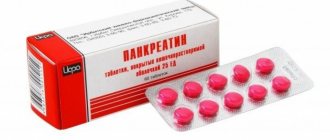Composition per 1 tablet:
Active substance:
Pancreatin - 100 mg The amount of pancreatin is indicated for a substance with an amylolytic activity of at least 1700 FIP units; lipolytic activity of at least 3000 FIP units; total proteolytic activity of at least 130 FIP units.
Excipients:
calcium stearate - 3.2 mg, potato starch - 7.4 mg, croscarmellose sodium - 1.2 mg, lactose monohydrate - to obtain an uncoated tablet weighing 320 mg
Excipients of the coating to obtain a tablet with a coating weighing 335 mg: titanium dioxide - 0.933 mg, azorubine dye (acid red dye 2C) - 0.025 mg, methacrylic acid and ethyl acrylate copolymer (1:1) - 6.948 mg, macrogol 4000 - 1.044 mg, talc - 4.184 mg, povidone - 1.866 mg.
Pancreatin tablets, enteric coated 25 units N60
Registration Certificate Holder
BIOSYNTHESIS PJSC (Russia)
Dosage form
Medicine - Pancreatin
Description
Enteric-coated tablets
1 tab.
pancreatin 25 units (100 mg)
10 pieces. - blisters (2) - cardboard packs. 10 pieces. - blisters (3) - cardboard packs. 10 pieces. - blisters (6) - cardboard packs. 60 pcs. - dark glass jars (1) - cardboard packs.
Indications
Insufficiency of exocrine pancreatic function (including in chronic pancreatitis, cystic fibrosis).
Chronic inflammatory-dystrophic diseases of the stomach, intestines, liver, gall bladder; conditions after resection or irradiation of these organs, accompanied by impaired digestion of food, flatulence, diarrhea (as part of combination therapy).
To improve the digestion of food in patients with normal gastrointestinal function in case of errors in nutrition, as well as in cases of impaired chewing function, forced long-term immobilization, and a sedentary lifestyle.
Preparation for x-ray and ultrasound examination of the abdominal organs.
Contraindications for use
Acute pancreatitis. Hypersensitivity to pancreatin.
pharmachologic effect
Enzyme agent. Contains pancreatic enzymes - amylase, lipase and proteases, which facilitate the digestion of carbohydrates, fats and proteins, which facilitates their more complete absorption in the small intestine. In diseases of the pancreas, it compensates for the insufficiency of its exocrine function and helps improve the digestion process.
Drug interactions
When used simultaneously with antacids containing calcium carbonate and/or magnesium hydroxide, the effectiveness of pancreatin may be reduced.
With simultaneous use, it is theoretically possible to reduce the clinical effectiveness of acarbose.
When used simultaneously with iron supplements, a decrease in iron absorption may occur.
Dosage regimen
The dose (in terms of lipase) depends on age and the degree of pancreatic insufficiency. The average dose for adults is 150,000 units/day. In case of complete insufficiency of exocrine pancreatic function - 400,000 units/day, which corresponds to the daily requirement of an adult for lipase.
Maximum daily dose
is 15,000 units/kg.
Children under 1.5 years old - 50,000 units/day;
over 1.5 years - 100,000 units/day. The duration of treatment can vary from several days (if the digestive process is disrupted due to errors in the diet) to several months and even years (if constant replacement therapy is necessary).
Side effect
When used in average therapeutic doses, side effects are observed in less than 1%.
From the digestive system:
in some cases - diarrhea, constipation, discomfort in the stomach, nausea. The cause-and-effect relationship between the development of these reactions and the action of pancreatin has not been established, because These phenomena refer to symptoms of exocrine pancreatic insufficiency.
Allergic reactions:
in some cases - skin manifestations.
From the metabolic side:
with long-term use in high doses, the development of hyperuricosuria is possible; in excessively high doses, an increase in the level of uric acid in the blood plasma.
Other:
When using pancreatin in high doses in children, perianal irritation may occur.
special instructions
Use in the acute phase of chronic pancreatitis is not recommended.
For cystic fibrosis, the dose should be adequate to the amount of enzymes that is necessary for the absorption of fats, taking into account the quality and quantity of food consumed.
For cystic fibrosis, the use of pancreatin in doses of more than 10,000 units/kg/day (in terms of lipase) is not recommended due to the increased risk of developing strictures (fibrous colonopathy) in the ileocecal region and in the ascending colon.
With high lipase activity contained in pancreatin, the likelihood of developing constipation in children increases. Increasing the dose of pancreatin in this category of patients should be carried out gradually.
Digestive system disorders may occur in patients with hypersensitivity to pancreatin, or in patients with meconium ileus or a history of intestinal resection.
Use during pregnancy and breastfeeding
Restrictions during pregnancy - With caution.
The safety of using pancreatin during pregnancy has not been sufficiently studied.
Use is possible in cases where the expected benefit to the mother outweighs the potential risk to the fetus. Experimental studies
have shown that pancreatin does not have a teratogenic effect.
Use in children
Restrictions for children - With caution.
Application is possible according to the dosage regimen. With high lipase activity contained in pancreatin, the likelihood of developing constipation in children increases.
Description:
Tablets coated with a pink or dark pink color interspersed with a specific odor, biconvex in shape, two layers visible on the cross section.
Pharmacotherapeutic group:
digestive enzyme agent.
ATX code
: A09AA02.
Pharmaceutical action
Pancreatin compensates for the insufficiency of the exocrine function of the pancreas and has proteolytic, amylolytic and lipolytic effects.
The enzymes included in pancreatin (lipase, alpha-amylase, trypsin, chymotrypsin) help break down proteins into amino acids, fats into glycerol and fatty acids, starch into dextrins and monosaccharides.
Improves the functional state of the gastrointestinal tract, normalizes digestion processes.
Trypsin inhibits stimulated pancreatic secretion and has an analgesic effect.
Pancreatic enzymes are released from the dosage form in the alkaline environment of the small intestine, since they are protected from the action of gastric juice by the membrane.
The maximum enzymatic activity of the drug is observed 30-45 minutes after oral administration.
pharmachologic effect
A digestive enzyme agent that compensates for the insufficiency of the secretory function of the pancreas and the biliary function of the liver, improves food digestion, and has proteolytic, amylolytic and lipolytic effects.
The pancreatic enzymes included in the composition (lipase, alpha-amylase, trypsin, chymotrypsin) contribute to the breakdown of proteins into amino acids, fats into glycerol and fatty acids, starch into dextrins and monosaccharides.
Trypsin suppresses stimulated pancreatic secretion, producing an analgesic effect.
The enzyme hemicellulase promotes the breakdown of plant fiber, which also improves digestive processes and reduces the formation of gases in the intestines.
Indications for use
Replacement therapy for exocrine pancreatic insufficiency: chronic pancreatitis, pancreatectomy, condition after irradiation, dyspepsia, Roemheld syndrome (gastrocardiac syndrome), cystic fibrosis; flatulence, diarrhea of non-infectious origin.
Impaired digestion of food (condition after resection of the stomach and small intestine); to improve food digestion in people with normal gastrointestinal function in case of errors in nutrition (eating fatty foods, large amounts of food, irregular meals) and in cases of chewing dysfunction, sedentary lifestyle, prolonged immobilization.
Preparation for X-ray examination and ultrasound of the abdominal organs.
Pancreatin
Pancreatin can be prescribed to patients of any age, including infants and the elderly, due to the possibility of individual dose selection by combining drugs with different dosages, as well as due to the ability to use the contents of gelatin capsules (pellets) directly for administration.
Capsules are taken orally, during or after meals, without chewing, with a sufficient amount of liquid (water, juices). If a single dose of the drug is more than 1 capsule, you should take half of the total number of capsules immediately before meals, and the other half during meals. If the single dose is 1 capsule, it should be taken with meals.
If swallowing is difficult (for example, in small children or elderly people), the capsule is opened and the drug is taken directly in pellets, having previously mixed them with a slightly acidic (pH <5.0) liquid or liquid food that does not require chewing (pH <5.0). ). Any mixture of pellets with food or liquid should be consumed immediately after preparation.
When treating with Pancreatin, to prevent increased constipation, it is important to ensure a normal level of water intake, especially with increased fluid loss.
The dose of the drug is selected individually depending on age and severity of symptoms. To achieve an adequate individual dose, in addition to Pancreatin 40,000 IU capsules, it is possible to use the drug Pancreatin with dosages of 10,000 IU or 25,000 IU.
Cystic fibrosis.
For children over 4 years of age, the average dose is 500 IU of lipase per kilogram of body weight at each meal. For children under 4 years of age, the initial calculated dose is 1000 IU of lipase per kilogram of body weight at each feeding (it is recommended to use the drug Micrasim® capsules 10,000 IU or 25,000 IU).
The dose should be selected individually, depending on the severity of the disease, the severity of steatorrhea and nutritional status. The maintenance dose for most patients should not exceed 10,000 units of lipase per kilogram of body weight per day.
For other conditions accompanied by exocrine insufficiency
pancreas,
the dose is set individually, taking into account the degree of digestive insufficiency and fat content in food, individual eating habits and the patient’s age. The dose of lipase required by the patient during the main meal (with breakfast, lunch or dinner) varies from 20,000 IU to 75,000 IU.
When treating with Pancreatin, the average initial dose of lipase is 10,000 - 25,000 units during the main meal (provided by using Pancreatin enteric capsules 10,000 units or Micrasim® capsules 25,000 units), however, higher doses may be required to achieve a therapeutic effect. Typically, the patient should receive at least 20,000 units to 50,000 units of lipase with food. In case of severe steatorrhea (more than 15 g of fat in feces per day), in the presence of diarrhea, loss of body weight and no effect of diet therapy, treatment begins with a dosage of 25,000 IU of lipase at each meal, but if necessary and well tolerated, the dose is increased to 35,000 IU — 40,000 units of lipase per dose. A further increase in the dose, in most cases, does not improve treatment results and requires a revision of the diagnosis, a reduction in fat in the diet and/or additional prescription of proton pump inhibitors.
The average dose of pancreatin for adults is 150,000 units/day; with complete blockade of the exocrine function of the pancreas - 400,000 units/day, which corresponds to the daily requirement of an adult for lipase. The maximum daily dose is 15,000 units - 20,000 units/kg. The permissible dose for children under 1.5 years of age is 50,000 units/day; over 1.5 years - 100,000 units/day. The duration of taking pancreatin can vary from several days (digestive disorders) to several months or years (long-term replacement therapy).
Side effects
Allergic reactions. In some cases - diarrhea, constipation, discomfort in the stomach, nausea (the cause-and-effect relationship between the development of these reactions and the effect of pancreatin has not been established, since these phenomena refer to symptoms of exocrine pancreatic insufficiency). With prolonged use in high doses, perianal irritation and irritation of the oral mucosa may occur. Patients with cystic fibrosis may develop strictures in the ileocecal region and in the ascending colon.
Pancreatin during pregnancy and lactation
While carrying a child, women often experience digestion difficulties. In this case, discomfort often occurs in the stomach, diarrhea, heartburn, and vomiting occur.
The medicine in question is known for its ability to effectively combat such health problems.
If a pregnant woman suffers from constipation, then the cause will be disorders related to the motility of the digestive system. The drug in question does not help in this case. It should be taken into account that constipation is one of the possible side effects of taking this medication.
Nausea and vomiting during pregnancy are often complications associated with intoxication, which occurs due to constipation. Therefore, Pancreatin will not be able to provide effective treatment.
The manufacturers of this drug claim that there have been no tests to see how it works while pregnant or breastfeeding.
Taking medication during this period is allowed only by the doctor’s decision. This medication is often prescribed for exacerbations of chronic pancreatitis.
special instructions
The safety of using pancreatin during pregnancy has not been sufficiently studied. Use is possible in cases where the expected benefit to the mother outweighs the potential risk to the fetus.
In cystic fibrosis, the use of pancreatin in high doses is not recommended due to the increased risk of strictures (fibrotic colonopathy). The dose should be adequate to the amount of enzymes necessary for the absorption of fats, taking into account the quality and quantity of food consumed.
With long-term use, iron supplements are prescribed simultaneously.
Contraindications
This medicine should not be taken in the following situations:
- when the patient suffers from acute attacks of pancreatitis;
- a patient with a chronic form of pancreatitis had an exacerbation;
- the use of Pancreatin is not recommended for those who have an acute sensitivity to such enzymes taken from animals;
- if hypersensitivity to the drug is detected;
- for those suffering from stomach obstruction;
- in the presence of acute hepatitis.



